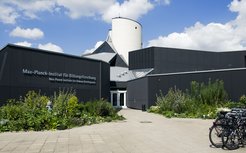About the Centre
The Max Planck UCL Centre for Computational Psychiatry and Ageing Research is dedicated to studying the causes of psychiatric disorders as well as the causes of individual differences in cognitive development, with an emphasis on adulthood and old age. Computational models of differences and changes in brain-behaviour relations are the Centre’s major theoretical tool. The Centre’s findings will provide information on how cognitive functioning can be maintained into old age and on how psychiatric disorders can be better recognized and treated more efficiently.
The Centre was founded in April 2014 and is the result of an existing collaboration between the Max Planck Society and University College London that began in 2011. The Centre is headed by Ray Dolan (University College London) and Ulman Lindenberger (Max Planck Institute for Human Development) and is located in London and Berlin. The London site is at Russell Square, in close vicinity to the Wellcome Centre for Human Neuroimaging. The Berlin site is housed at the Max Planck Institute for Human Development.
Prior to the Max Planck UCL Centre...
A JOINT INITIATIVE OF THE MAX PLANCK SOCIETY (MPS) AND UNIVERSITY COLLEGE LONDON (UCL)
In early 2011, scientists of the Max Planck Society and University College London launched an initiative on the development and application of computational methods that reorganize and improve our understanding of mental illness and behavioural ageing. The initiative embodied three coordinated programs:
- Activities directed at fostering research interactions, including an annual joint retreat and a visiting fellowship programme for scientists at all levels;
- Funding for two interrelated lines of research within the collaborative research programme, one focusing on decision-making in psychopathology and the other on individual differences in cognitive ageing
- Joint graduate training that consists of an exchange programme, and a summer school.
The core group of scientists consisted of Ray Dolan (coordinator UCL), Peter Dayan, Emrah Düzel, Karl Friston, and Read Montague from UCL; Ulman Lindenberger (coordinator MPS), Hans-Jochen Heinze (Leipzig, Magdeburg), and Arno Villringer from MPS; and five colleagues from other institutions, Lars Bäckman, Hauke Heekeren, Klaas Enno Stephan, Naftali Raz, and Gerhard Roth. The cooperating research institutions are the Wellcome Centre for Human Neuroimaging at UCL, the MPI for Human Development in Berlin, and the MPI for Human Cognitive and Brain Sciences in Leipzig.
The initiative was funded by the (a) MPS, (b) UCL, and (c) the German Research Foundation (DFG) through prize money from the Gottfried Wilhelm Leibniz Award given to Ulman Lindenberger in 2010. Initial funding was restricted to 2011 and 2012 but open for renewal if the initiative was successful.
The behavioural neurosciences and related disciplines have seen spectacular scientific advances that make them rich in scientific opportunity. The initiative was able to realise the potential of the scientific strengths at UCL and the MPS to build internationally leading research opportunities that neither could achieve alone.
Centre Site Berlin

Prof. Dr. Ulman Lindenberger
Director
Helena Maravilla
Coordinator
Max Planck Institute for Human Development
Lentzeallee 94
14195 Berlin
Germany
mps-ucl@mpib-berlin.mpg.de
Centre Site London

Prof. Ray Dolan FRS
Director
Dominique Drai
Coordinator
Russell Square House
10-12 Russell Square
London, WC1B 5EH
United Kingdom
d.drai@ucl.ac.uk

